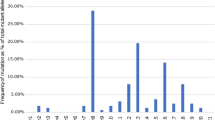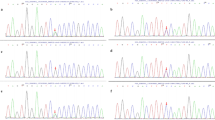Crohn’s disease (CD) is a heterogeneous disorder. A genetic linkage to chromosome 16 (IBD1) has been previously observed and replicated in unrelated populations. Recently, in this region, NOD2/CARD15 has been identified as a susceptibility gene. The aim of this report is to determine whether this gene is implicated in CD in a Tunisian population. One hundred thirty patients with CD and 90 healthy individuals were genotyped for the three common NOD2 variants (C2104T in exon 4, G2722C in exon 8, and 3020insC in exon 11). Furthermore, the 11 exons of the NOD2 gene were sequenced in 20 patients with CD. Results showed that the frequency of the CARD15 variants in the Tunisian population is significantly lower than that observed in the European and American population. Direct sequencing of CARD15 did not permit us to identify a characteristic mutation in our population. No association was confirmed between CD and the NOD2 gene in our Tunisian population. Furthermore, the NOD2/CARD15 gene has a variable association with CD in different populations. These results indicate the genetic variation of CD in different ethnic groups.
Similar content being viewed by others
References
Ogura Y, Bonen DK, Inohra N, Nicolae DL, Chen FF, Ramos R, Britton H, Moran T, Karaliuskas R, Duerr RH, Achkar JP, Brant SR, Bayless TM, Kirshner BS, Hanauer SB, Nunez G, Cho JH: A frameshift mutation in NOD2 associated with susceptibility to Crohn’s disease. Nature 411:603–606, 2001
Elson CO: Genes, microbes and T cells: new therapeutic targets in Crohn’s disease. N Engl J Med 346:614–616, 2002
Ahmad T, Satsangi D, MCGovern M, Bunce M, Jewell DP: The genetics of inflammatory bowel disease. Aliment Pharmacol Ther 15:731–748, 2001
Cho JH, Nicolae DL, Gold LH, Fields CT, Labuda MC, Rohal PM, Pickels MR, Qin L, Fu Y, Mann JS, Kirschner BS, Jabs EW, Weber J, Hanauer SB, Bayless TM, Brant SR: Identification of novel susceptibility loci for inflammatory bowel disease on chromosomes 1p, 3q and 4q: evidence for epistasis between 1p and IBD1. Proc Natl Acad Sci USA 95:7502–7507, 1998
Duerr RH, Barmada MM, Zhang L, Pfutzer R, Weeks DE: High density genome scan in Crohn disease shows confirmed linkage to chromosome 14q11-12. Am J Hum Genet 66:1857–1862, 2001
Satsangi J, Parkes M, Louis E: Two stage genome wide search in inflammatory bowel disease provides evidence for susceptibility loci on chromosomes 3, 7 and 12. Nat Genet 14:199–202, 1996
Satsangi J, Welsh KI, Bunce M: Contribution of genes of the major histocompatibility complex to susceptibility and disease phenotype in inflammatory bowel disease. Lancet 347:1212–1217, 1996
Hugot JP, Laurent Puig P, Gower Rousseau C, Olson JM, Lee JC, Beaugerie L, Naom I, Dupas JL, Van Gossum A, Orholm M, Bonaiti Pellie C, Weissenbach J, Matew CG, Lennard Jones JE, Cortot A, Colombel JF, Thomas G: Mapping of a susceptibility locus for Crohn’s disease on chromosome 16. Nature 379:821–822, 1996
International IBD Genetics Consortium: International collaboration provides convincing linkage replication in complex disease through analysis of a large pooled data set: Crohn’s disease and chromosome 16. Am J Hum Genet 68: 1165–1171, 2001
Ohmen JD, Yang H, Yamomoto KK: Susceptibility locus for IBD on chromosome 16 has a role in Crohn’s disease but not in ulcerative colitis. Hum Mol Genet 5:1679–1683, 1996
Hugot JP, Chamaillard M, Wouali H, Lesage S, Cezard JP, Belaiche J, Almer S, Tysk C, O’Morain CA, Gassul M, Binder V, Finkel Y, Cortot A, Modigliani R, Laurent Puig P, Gower Rousseau C, Macry J, Colombel JF, Sahbatou M, Thomas G: Association of NOD 2 leucine repeat variants with susceptibility to Crohn’s disease. Nature 411:599–603, 2001
Hampe J, Cuthbert A, Croucher PJ, Mirza MM, Mascheretti S, Fisher S, Frenzel H, King K, Hasselmeyer A, MacPherson AJ, Bridger S, Van Deventer S, Forbes A, Nikolaus S, Lennard Jones JE, Foelsch UR, Krawczak M, Lewis C, Schreiber S, Mathew CG: Association between insertion mutation in NOD2 gene and Crohn’s disease in German and British populations. Lancet 357:1925–1928, 2001
Ogura Y, Inohra N, Benito A, Chen FF, Yamaoka S, Nunez G: Nod 2, a Nod 1/Apaf 1 family member that is restricted to monocytes and activates NFκ B. J Biol Chem 276:4812–4818, 2001
Inohara N, Ogura Y, Chen FF: Human Nod1 confers responsiveness to bacterial lipopolysaccharides. J Biol Chem 276:2551–2554, 2003
Hisamatsu T, Suwuki M, Reinecker HC, Nadeau WJ, Mccormick BA, Podolosky DK: CARD15/NOD2 functions as an antibacterial factor in human intestinal epithelial cells. Gastroenterology 124:993–1000, 2003
Bonen DK, Ogura Y, Nicolae DL, et al. : Crohn’s disease associated NOD2 variants share a signaling defect in response to lipopolysaccharides and peptidoglycan. Gastroenterology 124:140–146, 2003
Inohara N, Ogura Y, Fontalba A, Gutierrez O, Pons F, Crespo J, Fukase K, Inamura S, Kusumoto S, Hashimoto M: Host recognition of bacterial muramyl dipeptide medited through NOD2. Implication for Crohn’s disease. J Biol Chem 278:5509–5512, 2003
Rosenstiel P, Fantini M, Brautigam K, Kuhbacher T, Waetzig GH, Seegert D, Schreiber S: TNF α and INFγ regulate the expression of the NOD2/CARD15 gene in human intestinal epithelial cells. Gastroenterology 124:1001–1009, 2003
Cho JH: Significant role of genetics in IBD: the NOD2 gene. Rev Gastroenterol Disord 3(Suppl 1):S18–S22, 2003
Mehdi A, Baccouche A: Epidemiologie des maladies inflammatoires cryptogenetiques de l’intestin dans le centre est de la Tunisie. Maghreb Med 314:47–52, 1997
Lennard-Jones JE: Classification of inflammatory bowel disease. Scand J Gastroenterol Suppl 170:2–6, 1989
Miller SA, Dykes DD, Polesky HF: A simple salting out procedure for extracting DNA from human nucleated cells. Nucleic Acids Res 16:1215, 1988
Lesage S, Zouali H, Cezard JP, et al. : CARD 15∖NOD2 mutational analysis and genotype phenotype correlation in 612 patients with inflammatory bowel disease. Am J Hum Genet 70:845–857, 2002
Barmada MM, Brant SR, Nicolae DL, Achkar JP, Panhuysen CI, Bayless TM, Cho JH, Duerr RH: A genome scan in 260 inflammatory bowel disease affected relative pairs Inflamm Bowel Dis 10:15–22, 2004
Vermeire S, Wild G, Kocher K, Cousineau J, Dufresne L, Bitton A, Langlier D, Pare P, Lapointe G, Cohen A, Daly MJ, Rioux JD: CARD15 genetic variation in a Quebec population: prevalence, genotypephenotype relationschip and haplotype structure. Am J Hum Genet 71:74–83, 2002
Cavanaugh JA, Adams KE, Quak EJ, Bryce ME, O’Callaghan NJ, Rodgers HJ, Magarry GR, Butler WJ, Eaden JA, Roberts-Thomson IC, Pavli P, Wilson SR, Callen DF: CARD15/NOD2 risk alleles in the development of Crohn’s disease in the Australian population. Ann Hum Genet 67:35–41, 2003
Inoue N, Tamura K, Kinouchi Y, Fukuda Y, Takahashi S, Ogura Y, Inohara N, Nunez G, Kishi Y, Koike Y, Shimosegawa T, Shimoyama T, Hibi T: Lack of common NOD2 variants in Japanese patients with Crohn’s disease. Gastroenterology 123:86–91, 2002
Leong RW, Armuzzi A, Ahmad T, Wong ML, Tse P, Jewell DP, Sung JJ: NOD2/CARD15 gene polymorphisms ans Crohn’s disease in the Chinese population. Aliment Pharmacol Ther 17:1465–1470, 2003
Arnott ID, Nimmo ER, Drummond HE, Fennell J, Smith BR, MacKinlay E, Morecroft J, Anderson N, Kelleher D, O’Sullivan M, McManus R, Satsangi J: NOD2/CARD15, TLR4 and CD14 mutations in Scottish and Irish Crohn’s disease patients: evidence for genetic heterogeneity within Europe. Genes Immun Jun∼10, 2004
Sugimura K, Taylor KD, Lin Y, Hang T, Wang D, Tang YM, Fishel-Ghodsian N, Targan SR, Rotter JI, Yang H: A novel NOD2/CARD15 haplotype conferring risk for Crohn disease in Ashkenazi Jews. Am J Hum Genet 72:509–518, 2003
Vavassori P, Borgiani P, Biancone L, D’apice MR, Blancogdel V, Vallo L, De nigris F, Monteleone I, Monteleone G, Pallone I, Novelli G: CARD15 mutations analysis in italian population. Inflamm Bowel Dis 10:116–121, 2004
Brant SR, Panhuysen CI, Nicolae D, Reddy DM, Bonen DK, Karaliukas R, Zhang L, Swanson E, Datta LW, Moran TG, Duerr RH, Achkar JP, Karban AS, Cho JH: MDR1 Ala893 polymorphism is associated with inflammatory bowel disease. Am J Hum Genet 73(6):1282–1292, 2003
Franchimont D, Vermeire S, El Housni H, Pierik M, Van Steen K, Gustot T, Quertinmont E, Abramowicz M, Van Gossum A, Deviere J, Rutgeerts P: Deficient host-bacteria interactions in inflammatory bowel disease?. The toll-like receptor (TLR)-4 Asp299gly polymorphism is associated with Crohn’s disease and ulcerative colitis. Gut 53:987–992, 2004
Peltekova VD, Wintle RF, Rubin LA, Amos CI, Huang Q, Gu X, Newman B, Van Oene M, Cescon D, Greenberg G, Griffiths AM, St George-Hyslop PH, Siminovitch KA: Functional variants of OCTN cation transporter genes are associated with Crohn disease. Nat Genet 36(5):471–475, 2004
Stoll M, Corneliussen B, Costello CM, Waetzig GH, Mellgard B, Koch WA, Rosenstiel P, Albrecht M, Croucher PJ, Seegert D, Nikolaus S, Hampe J, Lengauer T, Pierrou S, Foelsch UR, Mathew CG, Lagerstrom-Fermer M, Schreiber S: Genetic variation in DLG5 is associated with inflammatory bowel disease. Nat Genet 36(5):476–480, 2004
Author information
Authors and Affiliations
Corresponding author
Rights and permissions
About this article
Cite this article
Zouiten-Mekki, L., Zaouali, H., Boubaker, J. et al. CARD15/NOD2 in a Tunisian Population with Crohn’s Disease. Dig Dis Sci 50, 130–135 (2005). https://doi.org/10.1007/s10620-005-1290-0
Received:
Accepted:
Issue Date:
DOI: https://doi.org/10.1007/s10620-005-1290-0




